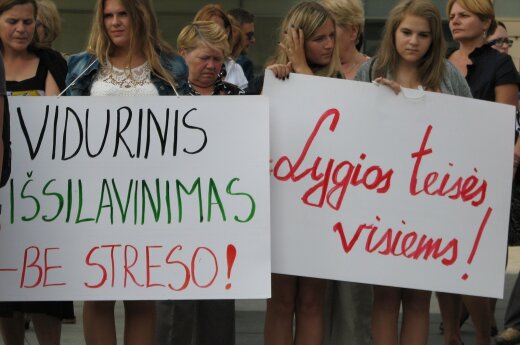- December 23, 2015
- 408
500PLN Financial Support for Polish Students in Lithuania, Since the 1st of September 2016

On Tuesday, Jan Dziedziczak, the undersecretary of Foreign Affairs, announced that, starting from the 1st of November 2016, each first grade Polish student and each student of a graduation class will receive financial help of 500zł. The permanent subcommittee of Polish minority in Lithuania was created in the Parliament.
During a conference in the Polish Parliament, Michał Dworczak, the president of the committee for liaison with Poles abroad, informed that they accepted the desideratum in which the Members of the Parliament appeal to the Polish Ministry of the Foreign Affairs to “intensify the discussion on the issues of the Polish minority living in Lithuania with the Lithuanian party.”
Among other things, the Members of the Polish Parliament, appeal to the Ministry of Foreign Affairs to also “take one-sided measures which long-term goal will be to support Polish education in the Vilnius region.”
Moreover, Dworczyk informed that the permanent subcommittee of Polish minority in Lithuania was created in the Parliament. “The Ministry of Foreign Affairs accepted the desideratum and they began the realization of this appeal.
The Ministry of Foreign Affairs, to face the needs of our fellow countrymen in Lithuania, starts the support programme for every Polish first grade and twelfth grade student. We want every Polish child attending classes at Polish schools to be granted financial backing of 500 PLN,” said Dziedziczak, the undersecretary of Foreign Affairs, during the conference. Annually, the program will cost about 1 million PLN. Every year, on 1st of September the support will be granted by the Lithuanian Consulate, together with the organization “Macierz Polska.”
“The Ministry of Foreign Affairs and the Polish government are disconcerted with what happens to Polish education in Lithuania. By this interim financial support we want to relieve our fellow countrymen who, while being loyal Lithuanian citizens, still want to develop in the field of their mother tongue, they want to speak Polish, learn in Polish, and discover Polish history and geography. The support we offer will help them,” emphasized Dziedziczak.
The undersecretary of Foreign Affairs added that Poland is still waiting for the implementation of the 1994 treaty between Poland and Lithuania, as well as the postulates of The Council of Europe.
Dziedziczak also referred to the inception of a special subcommittee dealing with the affairs of Polish community in Lithuania. “It is a precedent which is highly appreciated by us. It depicts the degree of engagement of parliamentary majority in endeavors to solve the problems of Poles in Vilnius region in accordance with European standards visible in other EU countries. We accept this fact with a satisfaction,” Dziedziczak continued.
In the desideratum handed over to PAP (Polish Press Agency), the contact committee expresses “a great distress with subsequent problems which affect Polish education in Lithuania.” Polish deputies point to the “lack of open dialogue with the representatives of Polish minority” and “further restrictions in access to Polish language” on the part of Lithuanian government.
The problems of Polish education in Lithuania began in 2011. Despite the protests of Polish community, Lithuanian Parliament enforced the educational act which standardised Lithuanian language exams, both in Lithuanian and minority schools. Lithuanian language used to be taught as a mother tongue at wider range in Lithuanian schools. In minority schools, on the other hand, it was taught less intensively and as a state language. The difference in curriculum between Lithuanian and minority schools amounts 800 hours. Before taking a standardised language exam, students attending schools with Polish or Russian lecture languages have to make up for curricular differences. This takes few years and often leads students to neglect other school subjects.
The situation of Poles in Lithuania and the realization of Polish-Lithuanian treaty from 1994, which, among others, includes the obligations toward national minorities.
Translated by Marta Didyk within the framework of a traineeship programme of the European Foundation of Human Rights, www.efhr.eu.

